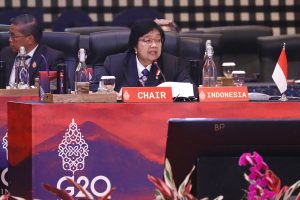Indonesia holds the presidency of the G-20 this year and will host the annual summit next month in Bali. The Russian invasion of Ukraine complicated what otherwise would have been a pretty straightforward opportunity for President Joko “Jokowi” Widodo and his government to showcase trade and investment opportunities in the country. Nevertheless, as we enter November and approach the summit, some of Indonesia’s priority policy items are being thrust into the spotlight and one of those is a green energy push.
Indonesian policymakers have talked a big game about green energy for a while. The country has previously pledged at global summits to reduce emissions and increase renewable energy generation. But these pledges, in my opinion, are often quite aspirational in nature and frequently fail to engage the reality of Indonesia’s political economy, where coal plays a very important role in exports and energy security, and where state-owned electric utility PLN owns and operates a large fleet of coal-fired power plants.
Previous efforts to jump-start private investment in wind and solar power have been sluggish, and dubious policies are often rolled out in an ad-hoc fashion such as a quickly announced then retracted plan to get consumers to switch to electric stoves. But there seems to be something a little different happening this time, with more comprehensive regulatory, legislative and political support coalescing behind the idea of a green transition. And I think that has to do with the upcoming G-20 summit.
The Asian Development Bank is working on its Energy Transition Mechanism, a fund which will offer some type of financial incentive to PLN in exchange for early retirement of a portion of its coal-fired power plants. PLN executives also announced last week that there were talks with European and American investors on a deal to retire some coal-fired plants early. The International Energy Agency recently released An Energy Sector Roadmap to Net Zero Emissions in Indonesia, which it developed in consultation with various government ministries.
A renewable energy law is currently being drafted, but in the meantime – presumably to get something on the books before the G-20 summit in November – Jokowi issued Presidential Regulation 112 of 2022. The regulation does what you would expect by seeking to streamline procurement, offer investment incentives, and clarify the tariff pricing scheme for renewable energy projects. It also mandates that no more coal power plants be constructed going forward, while leaving wiggle room around how certain terms are defined and exemptions for coal power plants already under construction.
What is interesting about all of this, when taken together, is that I think we are starting to see some real political will begin to accumulate behind these efforts. And you are going to hear a lot about it at the G-20, for a simple reason: the Indonesian government is signaling that it is willing to pivot away from coal and start investing in a green transition, as long as there are sufficiently attractive incentives to do so.
International funders and investors will be expected to help finance such a transition. Like it or not, coal has conferred significant political economic advantages on Indonesia in recent months. The country has also invested heavily in a system anchored by coal, and if that is to change there needs to be an alternate model of energy supply and distribution on the table. It’s useless to say stop building coal fired power plants, with no viable and realistic replacement in mind.
If you expect Indonesia to credibly commit to pivoting away from coal it needs to be clear what they are getting in return. This could include a range of things such as investment in electric vehicle manufacturing, technology and skill transfer related to renewable energy development, and of course financing and investment. And many of the players capable of offering such incentives will be gathered together in Bali next month.
Indonesia still needs to do a lot on its side, especially finalizing the regulatory and legislative framework through the binding lawmaking process. But if funders and stakeholders come to the table without good responses to the above incentive puzzle, then any commitments that emerge from the G-20 summit are likely to be as ephemeral and unrealistic as the ones that have come out of previous international summits.

































